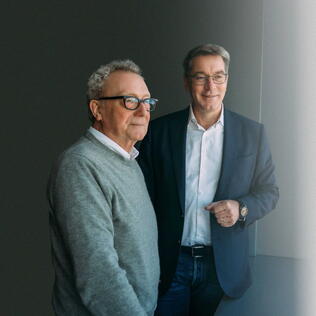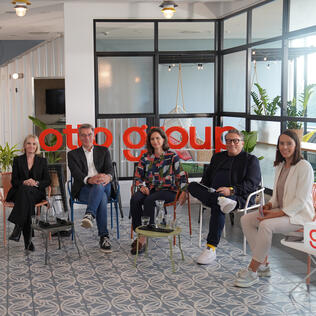percent want climate neutrality to be the benchmark for ethical consumption. They call on companies and brands to become the drivers of transformation towards climate neutrality.
Respecting the planetary boundaries

This story is part 3 of our series on
Trend Study.
The conventional way of doing business places a burden on people and nature and is therefore a discontinued model. Part three of our trend study series addresses the only viable alternative: the circular economy and its vital role in the fight against climate change.
Reorganizing how we generate energy is usually cited as the first measure to combat climate change. Successfully abandoning fossil fuels as a source of electricity and heat – as far as possible – would already represent a decisive step forward. This is undoubtedly true. But reducing resource consumption in the production of consumer and durable goods is equally important. The numbers are as huge as they are alarming. 100 billion tons of raw materials are used every year, but the industrial sector currently returns just 7.2 percent to the production cycle. So over 90 percent ends up on the growing garbage heaps littering our planet. Scientists are urging a significant reduction in the consumption of raw materials by 2050. Otherwise, they say, the earth will become uninhabitable as nature will have finally reached the point of no return. And the goal set by the German government of establishing a climate-neutral economy by 2045 will definitely remain unattainable without this change.
The trend study indicates that consumers are equally aware of the urgency:

The many sides of the circular economy
The concept of a circular economy is an important factor in this necessary transformation. It is multifaceted. For instance, the consumer goods industry should use raw materials in such a way that they can be reused multiple times and recycled comprehensively. This also applies to goods that have already been produced; recycling services for second-hand clothing and electrical devices need to be expanded. The same applies to services for repairing and maintaining products (see part two of this series). Recycle, reuse and recover are the imperatives of our time. But this will require a radical change to the way we do business and to our consumer habits as well – accompanied by clear action

A switch to the circular economy is the only way of achieving our defined goal of net-zero emissions and resource-efficient production. The Otto Group has taken clear action to drive this transformation.
These measures address many aspects of the circular economy. Three examples:
- Circular fashion: OTTO launched its first Circular Collection in 2022. A circularity ID is inserted into each dress, T-shirt or undershirt; it has an QR code that enables customers to find out which materials were used to produce the clothing and by which channels it can be returned and recycled if necessary.
- Second hand: About You sells quality-checked second-hand fashion under “Second Love”, helping to reduce the practice of discarding clothes and promoting the trend towards reuse.
- Packaging: OTTO collaborates with the start-ups Wildplastic and traceless to reduce the waste produced by online retail. traceless produces compostable shipping bags, which OTTO plans to introduce in 2024. Wildplastic makes these bags from recycled plastic that collectors have gathered in countries without recycling systems.
A radical rethinking is needed
Overall, the Otto Group will introduce sustainable and recyclable materials in its product portfolios across all Group companies. This reflects the wish expressed by many consumers, of whom 65 percent define ethical consumption as purchasing climate-neutral products. Despite the many promising approaches and statements, we are aware that the road to a resource-efficient, net-zero economy will be rocky. For example, over half of all smartphone users currently shy away from the costs of repairing defective devices. Many simply purchase a new device and throw the old one away. It follows, therefore, that suitable services must be introduced to initiate a change in consumer behavior and strengthen the circular economy – also at the request of consumers.
The Otto Group has significant experience in transforming its value chain in an ecologically and socially responsible way. We did not just learn yesterday that the economy must make a crucial contribution to climate neutrality. And the circular economy is a key driver of this process.
The circular economy pays off
Ultimately, a functioning circular economy is not only vital on the road to climate neutrality, but also for the economic success of the companies that embrace its principles. On the one hand, because consumers are increasingly demanding it. On the other hand, because companies can reduce their expenditures on raw materials, energy and waste disposal, which is likely to increase profits and establish a competitive advantage. The consulting agency Accenture predicts that a systematic introduction of the circular economy may generate an additional global economic output of 4.5 trillion US Dollars by 2030. Other forecasts also point to the potential creation of 700,000 additional jobs in the EU alone during the same period. So the outlook is promising. But now we must all act in concert to turn it into reality.
The trend study – structure and significance
The Otto Group has commissioned the Trendbüro consultancy agency with preparing the ‘Trend Study on Ethical Consumption’ since 2007. It has since become one of the most important periodic publications on the purchasing behavior of German consumers. 1000 people in Germany between the ages of 16 and 72 were interviewed for the most recent study.






